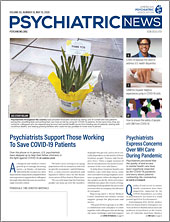The COVID-19 pandemic is disproportionately affecting black people, according to a study in the Morbidity and Mortality Weekly Report published online April 8.
Shikha Garg, M.D., and colleagues at the Centers for Disease Control and Prevention (CDC) analyzed data from the COVID-19–Associated Hospitalization Surveillance Network, which collects information about laboratory-confirmed COVID-19 hospitalizations in 14 states. Of the 1,482 patients in the network who were hospitalized with COVID-19 in March, the race or ethnicity of only 580 were known. Among those, 33.1% were black, whereas only 18% of the people who live in the areas surrounding network hospitals are black. In contrast, 45% of those hospitalized were white, more on par with the 59% of local residents who are white.
As individual states have begun to compile and post COVID-19 statistics, the disparity becomes more apparent.* In Michigan, blacks account for roughly 14% of the population but 30% of COVID-19 cases and 40% of COVID-19 deaths. In Louisiana, blacks account for 33% of the population but 56% of COVID-19 deaths.
The disparity has also played out in cities. According to figures posted by the city on April 21, 593 Chicago residents had died of COVID-19, and 323 of those deaths—54.5%—occurred in blacks, yet current U.S. Census figures suggest that blacks make up only 30% of the city’s population. In Milwaukee County, nearly 50% of confirmed COVID-19 cases and more than 50% of deaths from COVID-19 have occurred in blacks, who make up just 27% of the population.
Underlying conditions that are more prevalent in blacks, such as diabetes and hypertension, may be contributing to the substantially higher COVID-19 hospitalization and death rates in the black community. However, there are social factors at work as well, said Morgan M. Medlock, M.D., M.Div., M.P.H., an assistant professor of psychiatry at Howard University Hospital in Washington, D.C. She is the immediate past vice chair of APA’s Council on Minority Mental Health and Health Disparities.
“We need to name racism,” Medlock told Psychiatric News. “Racism impacts health outcomes through close alignment with socioeconomic status in this country. It is a structural entity that operates on institutions and in interpersonal dynamics, and it operates through internal mechanisms where a person who is subjected to an oppressive system may internalize the message ‘you are not valuable.’ Racism, operating on these three levels, has devastating effects on mental and physical health.
“As we think about solutions, we must think about why the statistics are so devastating for minorities living in cities,” Medlock added. “Many are locked out of access [to health services] due to segregation, marginalized to inadequate employment, and exposed to poverty and other stressors. City governments need to think about policies that protect these communities.” Medlock said the Coronavirus Aid, Relief, and Economic Security (CARES) Act could serve as a model for similar legislation to address these issues.
“The CARES Act provides concrete mechanisms for how we can address the economic factors that are interwoven with this crisis,” she said. “Why not pass something similar in Congress that also acknowledges the devastating effects of structural racism [and] addresses wealth inequality and access to health care?”
In a statement last month, APA CEO and Medical Director Saul Levin, M.D., M.P.A., called for government action and pledged APA’s assistance.
“It is time that the Trump administration convene a group of minority experts to create implementable steps to abolish health inequities in African American, Native American, and Hispanic communities,” Levin said. “We stand ready to help.” ■
* Data on COVID-19 infections, hospitalizations, and deaths change daily. These figures were current as Psychiatric News went to press.
“Hospitalization Rates and Characteristics of Patients Hospitalized With Laboratory-Confirmed Coronavirus Disease 2019—COVID-NET, 14 States, March 1–30, 2020” is posted
here.


